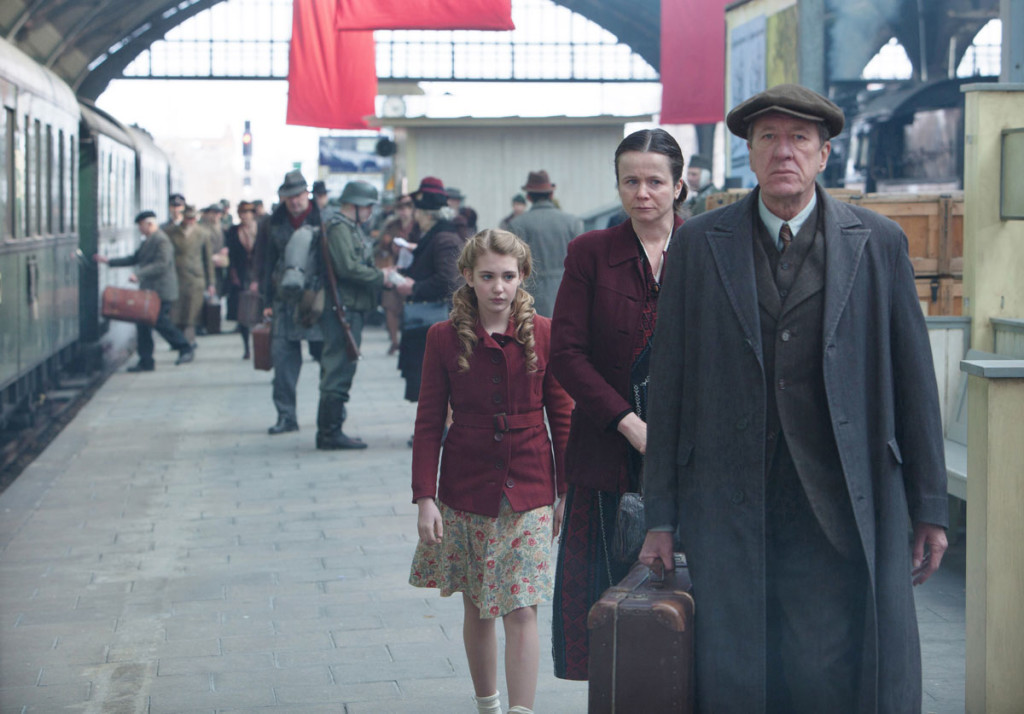There was a moment about two-thirds of the way through “The Book Thief” when something strange happened.
As I watched one of the film’s supposedly extra dramatic and emotional scenes, I fought the urge to pull my phone out of my pocket and check the time.
I was bored.

While this scene may appear tense, the majority of “The Book Thief” expressed no sense of fear of the Nazi regime.
I wasn’t bored because the film was bad or uneventful—there were moments throughout where I found myself close to tears—but because I had realized by that point that the stakes in the film never feel particularly high. There were very few moments of genuine tension and, up until the end, the characters are contained in a safe bubble of familiar warmth.
Director Brian Percival’s film is based on the much-loved young adult novel by the same name about a young girl named Liesel (Sophie Nélisse) who is sent to live with a foster family while her mother, a supposed communist, is hunted by the Nazis. The girl is left with her new parents—Hans (Geoffrey Rush) and Rosa (Emily Watson)—as winter and war hit Germany with full force. Liesel, who is illiterate, begins stealing books and learns how to read with her new father when the family is forced to hide the Jewish son of a friend in their basement. The young man, Max (Ben Schnetzer), bonds with Liesel over their shared grief and the two develop a friendship while the global political forces close in around them.
I haven’t read the book, but the film has the unfortunate characteristic of book-to-movie adaptations in which everything feels just slightly underdeveloped. You realize fairly early on that the movie is narrated by Death (Roger Allam), but he only speaks two or three times over the course of the movie. The monologues are well written and serve as some of the film’s most beautiful moments, but they left me wanting to hear more from
Death’s perspective.
This was true of most of the film’s other components as well. Liesel is a wonderful character and thankfully Nélisse does an admirable job playing her. It’s refreshing to watch a film about a young girl who’s never infantilized in the plot. Liesel is strong, clever and never willing to be forced into an easy romance with young Rudy (Nico Liersch).
Unfortunately, many of the connections that Liesel makes with the other characters feel rushed, and it becomes obvious that none of the relationships get the attention they deserve. We know, for example, that Liesel is extremely close to Max, but the two only have a few scenes together and these are so packed with thematic elements concerning books, literature and art that they feel contrived.
The film’s more unsettling fault is that a film about Nazi Germany so earnestly glosses over the more tragic elements of the time period. The movie’s Nazis seem more like caricatures: they break guitars and windows and pull people into the street—the standard evil-Nazi stuff you might expect—but they’re also severely unintimidating.
At one point in the film, one of the characters suspects something about Liesel’s family and threatens to report her to the authorities. Yet, after the scene, nothing happens. There are literally no obvious consequences in the plot. It’s moments like this that steal much-needed anxiety from the movie.
The film does have some beautiful visuals, however, and the gray-blue tones that dominate the film make for some very appealing imagery. But “The Book Thief” ultimately plays it too safe and, if anything, just makes you want to read the book.
If you already have, the film might be worth a trip just to see a story you love rendered on screen. Otherwise, stick with the print.








